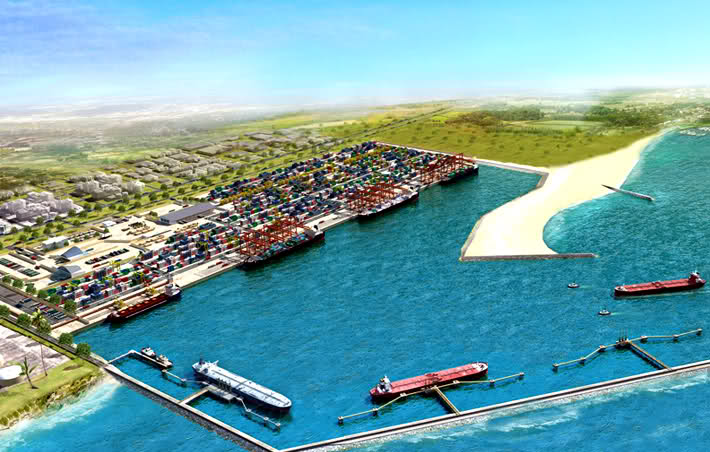Latest reports on the Lekki deep seaport indicate that the new port is nearing completion and may commence operations in the third quarter of 2022. Promoters of the port say it is now 66 per cent completed, and have restated their commitment to meet the deadline.
According to the Managing Director of the port, Mr. Du Ruogang, the project is on schedule for completion, and progress will continue to be made on the construction of the port, as well as preparations for the commencement of port operations. The Lagos State Governor, Babajide Sanwo-Olu, also recently confirmed the imminent completion and commissioning of the strategic port.
Apart from all these recent pronouncements on the progress of construction work and preparations for commencement of operations, the Chairman of Lekki Port LFTZ Enterprise Limited, Abiodun Dabiri, had last July assured that the project was on course, and gave the assurance that construction work would be completed at the end of third quarter in 2022, while commercial operations would commence by fourth quarter of 2022 as planned.
When completed, the Lekki deep seaport is expected to be a modern port. The owners said it would be a world-class port, operating with best-in-class equipment that will ensure seamless operations and compliance with global environmental protection standards. It will also be the deepest seaport in sub-Saharan Africa, and is being positioned to serve as a trans-shipment hub for the region.
However, it is pertinent to point out that the issue of how cargoes will be evacuated from the port remains one big unanswered question. Up to this moment, no serious effort is seen to have been made to address stakeholders’ observations and concerns concerning the evacuation of cargoes from the port. While the completion of the project is being fast-tracked to meet the deadline, it is apparent that the evacuation of cargoes from the port is being taken for granted.
Right from the inception of the project, stakeholders and observers have been asking questions about the method of evacuation of cargoes from the port. They had often observed the absence of a rail link to the port, and often called on the promoters of the project to address the concern. This is because without a rail link, the gigantic project and its location could create another nightmare reminiscent of the Apapa and Tin Can Island ports in Lagos when it becomes operational.
It is indeed worrisome to observe that a port of this magnitude is being built without clear plans for rail connectivity and inland waterways transportation. The absence of a rail link has been confirmed by a senior official of the port who said the master plan of the project does not include rail. Though he said it was not too late to include it in the project because adjustments are possible in any ongoing project, one is surprised that not much has been said or done in this regard.
The project promoters expect the Federal Government, represented by Nigerian Ports Authority (NPA) to make the move in order to have the rail factored into the project. With the ongoing rail development in the country, the promoters have said that if NPA contacts them on the matter, they will adjust and incorporate it in the work. Experts have also observed that since the coastal rail would come through the neighbourhood of the Lagos Free Zone, incorporating a rail system into the deep seaport would not be an issue if quickly addressed by the government.
Unfortunately, neither NPA nor its supervising ministry – the Federal Ministry of Transportation – has deemed it fit to address this important issue, yet the project is nearing completion.
We make bold to say that the greatest mistake the government and the promoters of the deep seaport project can make is to begin operation at the port without a rail link or adequate arrangement for multi-modal transportation. Already, the Lekki-Ajah corridor is home to heavy traffic, and upon completion, the Ibeju-Lekki-Epe axis will witness huge traffic arising from the operations of the deep seaport and the Dangote Refinery among the other major projects sited in the Lekki Free Trade Zone.
Although some officials of the project have said that all the issues would be solved, as proper plans have been put in place to ensure everything comes out fine, one expects to see these plans being executed alongside the ongoing port construction, in order to ensure that everything necessary is done in the quest to meet the deadline. It is not enough to talk of plans that will amount to putting the cart before the horse.
The port should commence operations with a rail link and modern barges ready to take the cargoes away from the port without resorting to using the narrow and already congested road. The road should not be used to evacuate cargo from the port. If Lekki deep seaport is truly a modern port as its promoters claim, then it must be modern even in the mode of cargo evacuation. We say no to pushing container trucks and other cargo trucks on the Lekki-Epe corridor.
The Lekki Deep deep seaport is expected to deliver numerous benefits to the Nigerian economy and the West African sub-region as a whole. For it to live up to its high billing, evacuation of cargoes from the port by road should not add to the pains Lagosians already experience daily on the road.
Copyright Ships & Ports Ltd. Permission to use quotations from this article is granted subject to appropriate credit given to www.shipsandports.com.ng as the source.
